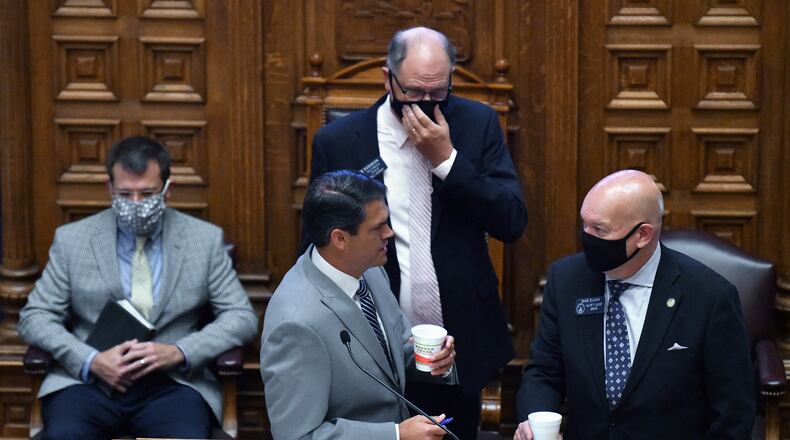After not meeting for three months because of the coronavirus pandemic before returning this week, the General Assembly met Saturday in a rare weekend session to move closer to finally completing the 2020 session.
Typically, legislative sessions end in late March or early April, but lawmakers will be happy to finish this year Friday after the pandemic derailed their plans and forced a lengthy suspension.
While most of the dozen or so bills they considered Saturday were mundane, lawmakers now face a five-day sprint to pass a $25 billion state budget with massive spending cuts, consider a new hate-crimes law and potentially vote on whether to allow stores and restaurants to deliver wine and beer and to more than triple the state's tax on cigarettes.
The session restarted Monday with new rules about wearing masks and social distancing. By Saturday, some House members had gotten lax enough that House Speaker David Ralston, R-Blue Ridge, had to remind them that masks were mandatory in his chamber.
Emotions were still high in the Senate after a panel on Friday passed hate-crimes legislation that added police to the classes of people that would be protected under the measure.
The Georgia House in March 2019 approved House Bill 426, which would give sentencing guidelines for anyone convicted of targeting a victim based on race, color, religion, national origin, sexual orientation, gender, mental disability or physical disability. A Senate committee on Friday passed its own version that added police to the list, over objections from Democrats.
The legislation comes at a time when the killings of black men at the hands of white men have spurred weeks of protests across Georgia and the country calling for an end to police brutality and for racial justice. Two of those high-profile deaths occurred in Georgia, one involving two Atlanta police officers.
State Sen. Renee Unterman, a Buford Republican, on Saturday called out state Sen. Elena Parent, an Atlanta Democrat, for saying the Senate hate-crimes legislation was not a "real" effort to curb hate-motivated crimes.
“This is a red-hot poker, and you’re poking that poker into a fire that is just bursting open. And it has the consequences of burning this building down,” Unterman said.
She said she supports passing hate-crimes legislation.
“We need to pass a hate-crimes bill for the whole state of Georgia,” Unterman said, looking in the direction of Parent’s seat in the chamber. “I encourage you to do better.”
But state Sen. David Lucas, a Macon Democrat, delivered an emotional speech of his own — calling out Republican Senate leadership for what he said was a reversal on an agreement that had been reached with Democrats on the bill.
“The reason we are here and all of the discussion (is happening) around the world is because of police,” Lucas said. “It’s because somebody in a police department did something that was ludicrous.
“In a hate-crime bill that’s been brought on by incidents of the police, and then to put police as a protected class — it seems to me it is a poison pill to kill the hate-crimes bill in this deliberative body.”
Lucas said he didn’t run for office to “fight the Civil War all over again.”
“Do you know what it’s like to be like this?” asked Lucas, who is black, holding out the back of his hand before pausing to wipe away tears.
Lawmakers return Monday and will have five days to decide whether to pass a new hate-crimes law.
The one thing they, by law, must do is pass a budget for fiscal 2021 — which begins July 1. The Senate passed a version Friday that would cut $2.6 billion in spending due to an expected drop in tax collections during the coronavirus pandemic recession. House and Senate leaders named their negotiating teams Saturday to come up with a final spending plan.
Lawmakers also have a long list of bills to consider, including measures to give some legal protection against lawsuits to businesses that have opened up since the coronavirus pandemic shutdown ended, the beer and wine delivery measure, and a proposal to raise cigarette taxes from 37 cents per pack — among the lowest in the county — to $1.35, still below the national average.
A bipartisan group of senators is pushing the proposal in hopes of raising enough money to help mitigate some of the spending cuts. The budget the Senate approved would eliminate about 1,000 jobs and force thousands of state and university workers to take days off without pay. It would also cut funding to a lengthy list of health care, mental health and substance abuse programs.
Keep Reading
The Latest
Featured





